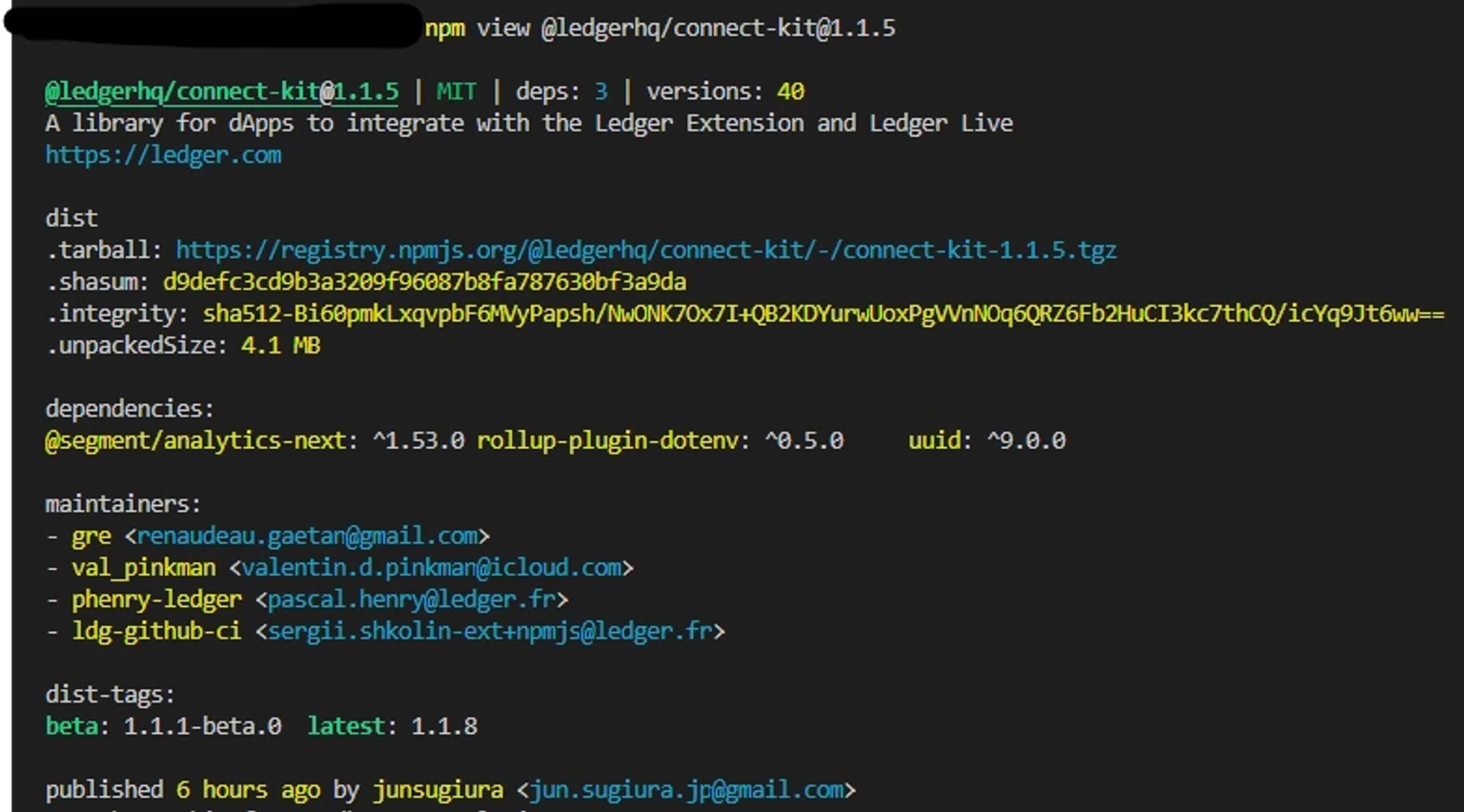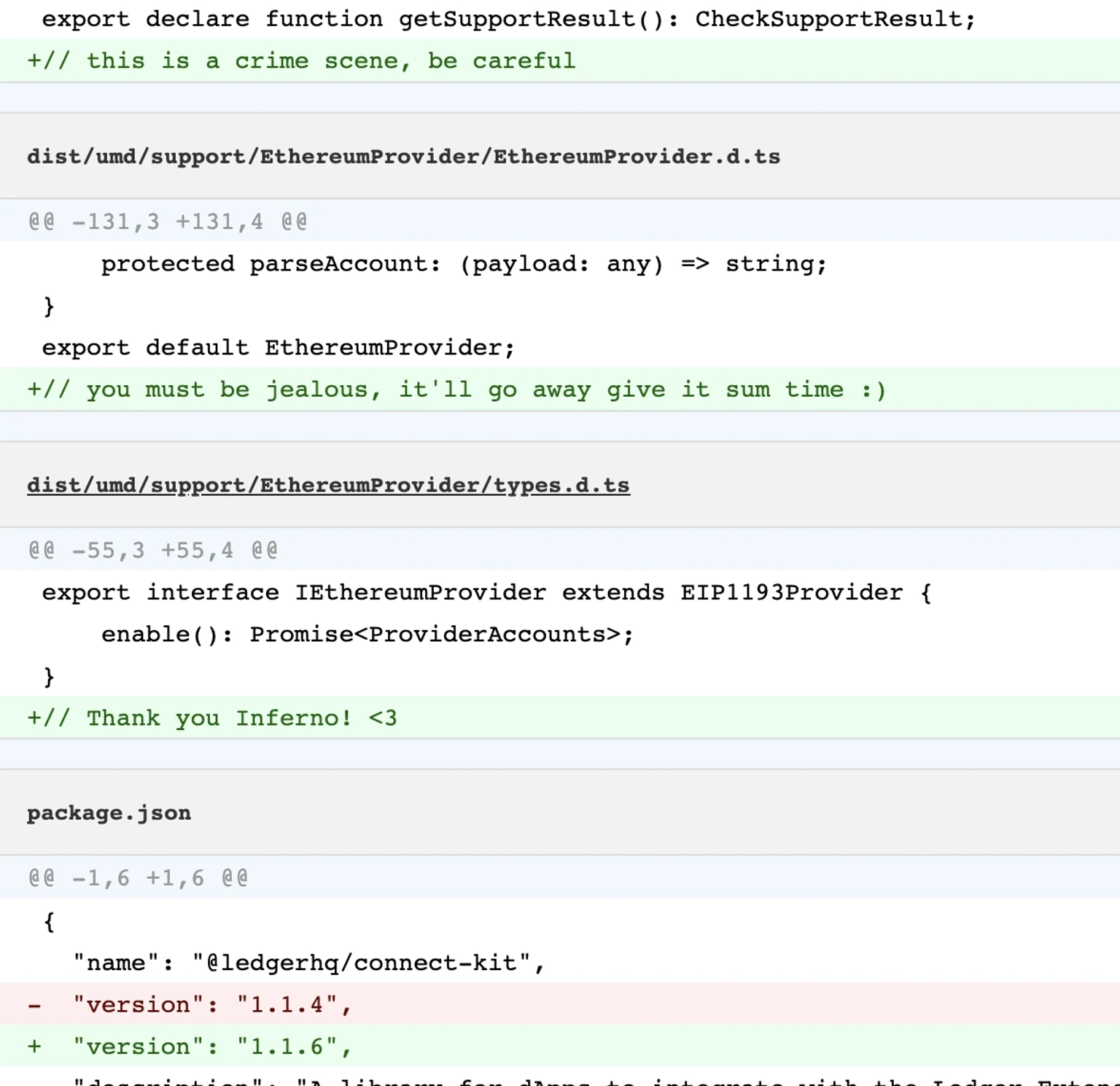
Taking a Closer Look at the YIEDL Exploit
Learn how Yiedl was exploited, resulting in a loss of assets worth approximately $160,000.
Youtube Video
Playing the video that you've selected below in an iframe

Learn how the supply chain attack on Ledger was exploited to affect numerous dApps.
On December 14th, 2023, Ledger encountered a significant security breach targeting Ledger Connect Kit, a Javascript library to connect websites with wallets, leading to a large-scale supply chain attack affecting numerous dApps, causing a loss of assets worth over $610,000.
Ledger provides a wallet solution designed for storing and managing cryptocurrency assets.
The orchestrator of this exploit was a former Ledger employee who had reportedly fallen victim to a phishing attack. This unfortunate incident granted malicious actors access to the employee's NPMJS account, a package manager for JavaScript-based libraries. Subsequently, the attackers uploaded and published malicious files within the Ledger Connect Kit.

Ledger utilized a Content Delivery Network (CDN) to distribute its JavaScript library. Unfortunately, they loosely specified dependencies and did not lock the version of the loaded JavaScript files. The code snippet below illustrates this aspect:
export async function loadConnectKit(): Promise<LedgerConnectKit> {
const src = "https://cdn.jsdelivr.net/npm/@ledgerhq/connect-kit@1";
const globalName = "ledgerConnectKit";
return new Promise((resolve, reject) => {
const scriptId = `ledger-ck-script-${globalName}`;
// we don't support server side rendering, reject with no stack trace for now
if (typeof document === "undefined") {
reject("Connect Kit does not support server side");
return;
}
if (document.getElementById(scriptId)) {
resolve((window as { [key: string]: any })[globalName]);
} else {
const script = document.createElement("script");
script.src = src;
script.id = scriptId;
script.addEventListener("load", () => {
resolve((window as { [key: string]: any })[globalName]);
});
script.addEventListener("error", (e) => {
reject(e.error);
});
document.head.appendChild(script);
}
});
}
Let’s understand this part of the code from the above function -
const src = "https://cdn.jsdelivr.net/npm/@ledgerhq/connect-kit@1";The 'src' variable pointed to a CDN provided by jsDelivr, fetching `version 1` of the @ledgerhq/connect-kit package from the npm registry. This means the above library as well as `@ledgerhq/connect-kit-loader` allow dApps to load the associated package at runtime from a CDN. While this approach allowed web applications to retrieve the package from a CDN for enhanced performance and reliability, it introduced a critical security flaw.
Ledger's rationale behind this approach was to expedite logic and UI improvements without necessitating wallet libraries and dApps to update their package versions and release new builds. However, this convenience came at the expense of security since it failed to restrict the version of the package being fetched.
Consequently, even organizations implementing stringent security practices and locking the package loader version remained vulnerable. The core source file hosted by Ledger perpetually relied on the latest version of the connect-kit package, from >=1.0.0 to <2.0.0. This oversight permitted attackers to infiltrate all protocols employing the connect-kit package.
This approach posed an extraordinary threat, compromising decentralization and security by introducing an element of trust. The impacted packages placed unwavering trust in whatever the CDN published or upgraded within the library. In the event of a compromised package, all downstream dApps employing it were left defenseless, devoid of any safeguards.
It is noteworthy that the Ledger team has been directly publishing upgrades to NPM without corresponding updates to their GitHub-based repositories. Remarkably, three releases of this package—v1.1.5, v1.1.6, and v1.1.7—contained malicious code.
Consequently, even though Ledger had never officially released any of these compromised versions, a phished credential was all the attackers needed to smoothly serve the tainted package via the CDN, effectively distributing it to all entities utilizing the package.

The attacker also added random comments throughout the code base.

The compromised versions were equipped with a malicious drainer that deceived users into authorizing malicious transactions, essentially pilfering various tokens and currencies across multiple decentralized exchanges (DEXs).
In response to the recent supply chain attack on Ledger, it is imperative to proactively implement robust security measures to safeguard both organizations and users within the cryptocurrency ecosystem. These measures are aimed at preventing similar incidents and fortifying the integrity of the supply chain.
First and foremost, stringent access management policies must be embraced by organizations, including Ledger. Regularly reviewing and revoking access from former employees should be part of a comprehensive offboarding process that includes the disabling of all access points to sensitive systems. This proactive step prevents unauthorized access and the potential misuse of credentials.
Another vital security measure involves transitioning away from reliance on third-party Content Delivery Networks (CDNs) in favor of self-hosting critical resources. Self-hosting affords greater control over asset distribution and integrity, effectively reducing the risk of malicious interference through CDN vulnerabilities.
Developers and organizations must exercise diligence when integrating external code or dependencies. Instead of blindly loading code, it is imperative to adopt practices such as version pinning and checksum verification to ensure the integrity of imported libraries. Such practices guarantee that the code being utilized aligns with the expected and secure version.
To foster trust within the cryptocurrency community, consideration should be given to open-sourcing code. This commitment to transparency not only facilitates community-driven scrutiny but also encourages responsible vulnerability disclosure. Open-source practices empower the community to collectively identify and address security concerns, bolstering overall security.
To further enhance security, robust code review and deployment protocols should be established. This includes implementing "2 man rules" for code review and deployment, a process that requires multiple individuals to approve and oversee critical procedures. These protocols introduce checks and balances, reducing the risk of unauthorized or insecure code alterations.
In parallel, users must actively engage in securing their cryptocurrency assets. Properly verifying transactions on hardware wallets before signing them is imperative. This precautionary measure allows users to confirm the legitimacy of transactions and ensures that they do not inadvertently authorize malicious activities.
Lastly, it is essential to actively encourage and incentivize security reviews and vulnerability disclosures within organizations. This proactive approach can lead to the identification and mitigation of security vulnerabilities before they can be exploited. Recognizing and rewarding individuals who contribute to strengthening security fosters a culture of vigilance and collective responsibility.
Despite rigorous security measures, the complete elimination of exploitation risks remains unattainable. This inherent uncertainty underscores the critical importance of robust cover policies, such as those offered by Neptune Mutual. By establishing a dedicated cover pool in our marketplace, the aftermath and impact of attacks like the one experienced by Ledger and other affected DeFi protocols could have been significantly mitigated. Our coverage provides users with assurance by mitigating losses of funds or digital assets resulting from smart contract vulnerabilities, thanks to our specialized parametric-based cover policies.
For users who opt for our parametric cover policies, the need to submit proof of loss for a payout is eliminated. Once an incident is verified and resolved through our incident resolution system, affected parties can immediately claim their payouts.
Our marketplace operates on various well-known blockchain networks, including Ethereum, Arbitrum, and the BNB chain, with the aim of extending protective cover to a wide range of DeFi users. Our presence in the ecosystem not only provides a safety net for users but also reinforces their trust in the DeFi ecosystem.
Furthermore, Neptune Mutual's security team conducts meticulous assessments of platforms across various security aspects, including DNS and web-based security, frontend and backend security, and intrusion detection and prevention systems, among others. These comprehensive assessments are pivotal in identifying potential vulnerabilities and enhancing platform security. In doing so, we fortify platforms against future security incidents and unauthorized exploits, ensuring a more secure DeFi environment for all participants.
Reference Source Ledger